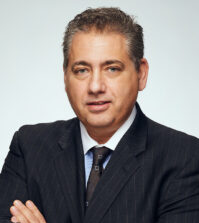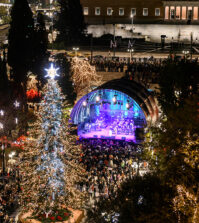The reopening of Greek Schools in Imvros highlights a Greek renaissance
by Kelly Fanarioti
It was September 2005—fifty-one years after the Turkish government’s ban on Greek education in Imvros and Tenedos islands–that the Greek High School in Imvros reopened its gates. It was the dream of hundreds of Greeks who were forced to leave their island after the 1964 policies by Turkey that led to the expulsion of most her Greek inhabitants. The Lauzanne Treaty, by which the two islands were conceded to Turkey, stipulated that their Greek inhabitants would have an autonomous status and manage their own affairs and education. Turkey unilaterally reneged on her signed obligations, forcing most people out and building prisons and bringing new settlers in from Anatolia.

Ecumenical Patriarch Bartholomew, himself an Imvrian, with parents and students of the Greek school
The opening of the Greek school in Imvros, beyond the immense historical significance, has great practical value for the few Greeks still living on the island. It has also been a decisive factor in the return of many families. Among the people, who with their insistence and courage managed to give flesh and blood to the dream of reopening the school, is the fifty-five-year-old teacher, Ioakim Kambouropoulos.
He was seven years old when he had to leave his family and go to Constantinople to attend a Greek school. In 2015, forty-five years later, he has returned to the island as the director of the reopened Greek High School, where he was once a pupil in the elementary classes, attending the courses in Turkish.

This year’s Haghiasmos (Blessing) at the school
”Then, I was a child helpless to react to everything that was happening. Now, I can help to correct an injustice of the past, to the extent that this can be done, because things will never be as previously. It is not just a thrill, but what’s going on inside me reaches the limits of the shock,” he said, emphasizing that this would be the beginning of a general rebirth of Hellenism on the island.
The return of new couples who have children is of utmost importance for Mr. Kambouropoulos. “You have to prepare an educational environment for these children, otherwise it is like telling them to leave again. We are optimistic that we are building on a momentum that can signal better days in general.”
Three years after the reopening of the Greek schools in Imvros, dozens of families returned to their homeland. “Several families settled on Imvros because of schools. They were originally from the island who wanted to return, but the lack of education was a hindrance. In 2012 there was only one Greek child in Imvros who went to a Turkish school. Today we have a total of 46 children and it seems impossible,” says the President of the Imvrian Society, Costas Christoforidis. “At the same time, there are many Turks who buy houses on the island and they are supportive of our efforts. They are concerned about our problems and a great solidarity has developed between us,” he underlines. All this would not have been possible without the contribution of the Ecumenical Patriarch Bartholomew – originally from Imvros, as was the late Archbishop Iakovos – and some of the monasteries of Mount Athos.
The school so far is quite successful. “All students enter the university after graduation, and this is a success for the school and its teachers,” Christoforidis said, pointing that this year a student’s project was selected among hundreds from across Europe and would be awarded by CERN, the largest research center in the world.

Apassia, a new Greek café in Imvros
Besides the Greeks from Imvros who returned, there are also many other Greeks who decided to emigrate because of the economic crisis that affected Greece. One of them is the forty-five-year-old Vassilis Spiliotis from Athens, who three years ago decided to leave his life in the Greek capital and start anew with his wife and three children in Imvros.
As he explained to NEO, his life there is much calmer and he does not intend to return to Greece. “I had two shops in Athens, but the financial crisis has destroyed us. As soon as I heard that the Greek schools will be opened in Imvros, I made the decision to go, not only because of financial problems but because I wanted to support the effort to revive the Greek element on the island.” He now manages the community cafe in the village of Agridia – the village where the Greek schools are – and he is very pleased with the course of his life. When he decided to emigrate, both his wife and children did not want to leave their lives in Athens. But now they have adapted and even his teenager daughter did not want to go for studies to Greece. “She made friends here, she is truly adapted and likes the island. But she had to leave for the university.”
The next objective of the Imvrian people is the economic stabilization of those who made the big decision to leave their lives in the big urban centers of Greece and return to their roots. According to Mr. Christoforidis, some have already left their professional footprints in the tourism sector, which has been particularly flourishing in recent years. “The village of Agioi Theodoroi is a miniature of Plaka with Greek cafes and restaurants. This is how we want the other villages of the island to grow so that the inhabitants gain wealth that will allow them to stay in the area. Tourism is the only industry that can offer work because all the arable land in Imvros has been expropriated by the state.”















0 comments